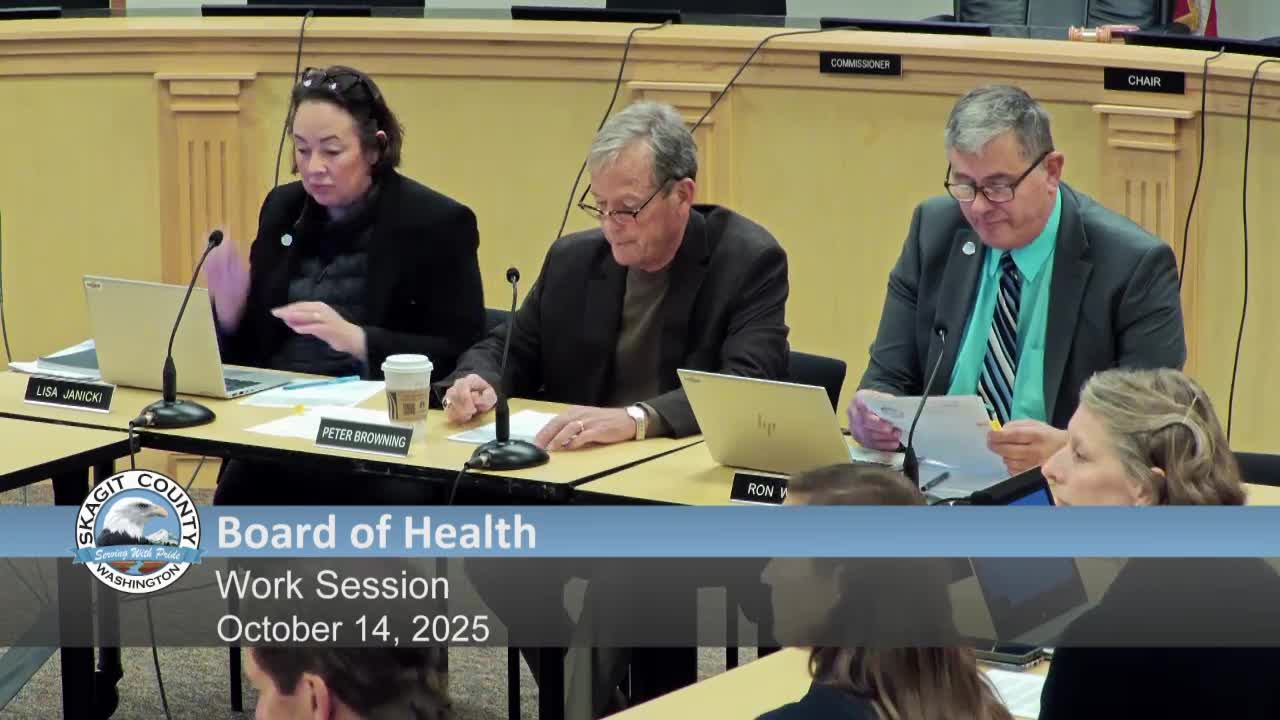Skagit County health officials present community health assessment as budget cuts force ‘right‑sizing’ of services
Get AI-powered insights, summaries, and transcripts
Subscribe
Summary
Skagit County Public Health and the Population Health Trust presented a community health assessment (CHA) to the Skagit County Board of Health on Oct. 14, outlining a set of priority issue areas — housing, economic stability, behavioral health, health‑care access and children’s readiness for school — while interim Public Health Director Jennifer Johnson said the department must ‘‘right‑size’’ services as one‑time COVID revenues and other time‑limited funds end.
Skagit County Public Health and the Population Health Trust presented a community health assessment (CHA) to the Skagit County Board of Health on Oct. 14, outlining a set of priority issue areas — housing, economic stability, behavioral health, health‑care access and children’s readiness for school — while interim Public Health Director Jennifer Johnson said the department must ‘‘right‑size’’ services as one‑time COVID revenues and other time‑limited funds end.
Johnson told the board: "we're facing a very difficult budget year. Going forward into 2026. We are kind of at this pivotal, situation where, our COVID revenue and a lot of 1 time, or time limited, different revenues are have come to an end." She said the department will prioritize foundational public health services — "foundational communicable disease, child and family health, prevention and environmental health" — and align the service model with essential local public health functions.
The CHA was presented by staff and partner representatives from the Population Health Trust, which reviewed about 180 indicators and distilled them into issue statements. Annalise Van Schaub of the Employment Security Department framed economic stability as a social determinant that intersects with other priorities, noting wage growth since the pandemic and persistent cost pressures. "For a single adult with 1 child would need to make about $45.62 per hour in order to cover basic expenses," she said, summarizing the assessment's affordability findings.
Key findings presented or discussed include: - Housing: Rent in Skagit County has risen sharply since 2012 (presenters cited a 77% increase), and an estimated one in four households spend more than half their income on rent. Presenters and Board members flagged zoning, permitting and stigma against affordable/transitional housing as barriers; Population Health Trust members urged coordination with the North Star housing effort to avoid duplication of work. - Economic stability and basic needs: The assessment uses ALICE (Asset Limited, Income Constrained, Employed) data and other measures; presenters said roughly 1 in 4 families struggle to make ends meet, about 13% of the county population receives SNAP benefits and more than 4,500 local families qualify for WIC. Childcare can consume up to about 18% of a household’s income in some scenarios, the presenters said. - Health‑care access and insurance: Chris Johnston of PeaceHealth United General said Skagit’s uninsured rate is about 7%, roughly 9,100 people, and that PeaceHealth projects another 3,500 people could lose coverage due to Medicaid changes; an additional 1,500 could be affected if advanced premium tax credits are not extended. Johnston warned that emergency department use has risen sharply: "Our ED visits over the last 4 years have increased 44%" (from roughly 11,682 to about 16,909 annual visits), and that high deductibles and out‑of‑pocket costs are creating barriers to preventive care. - Behavioral health and substance use: The trust reported adult loneliness and self‑reported poor mental health as concerns, with about 18% of adults reporting poor mental health for two weeks or more. Overdose rates rose to about 42 per 100,000 in 2023; presenters said naloxone is widely distributed and was administered in about 87% of reported overdose events in 2024. Presenters described expanding street outreach, harm reduction and medication‑assisted treatment (MOUD) availability. - Children and youth: The CHA drew on the Washington Healthy Youth Survey, WA Kids kindergarten measures and focus groups. Trust members reported a gap in early childhood outcomes: roughly four of 10 Skagit kindergarteners do not meet the CHA’s kindergarten‑readiness measure, compared with a higher statewide readiness figure. Presenters also said nearly half of tenth graders report chronic worry and a third show symptoms consistent with generalized anxiety disorder; youth who are gender‑diverse or identify as LGBTQ+ face higher rates of mental health challenges and self‑harm indicators.
Board discussion centered on how the trust and county can move from data to action under constrained budgets. Commissioner Peter Browning emphasized prevention and community connection as leverage points, noting loneliness and technology use as upstream contributors to poor mental health. Staff and trust members recommended process and utilization metrics to monitor prevention efforts — for example, tracking whether families are reached by early‑childhood supports, rather than waiting for distal outcome changes.
During the work session, the Board of Health approved minutes from prior meetings by motion (no additional policy items were voted). The meeting closed after public comment and brief discussion of infectious disease preparedness, including tuberculosis and pathways for legislative funding when exceptional treatment costs arise.
The Population Health Trust asked the board for direction on priorities to focus collective impact work in 2026 given diminishing resources; trust staff said they will use the CHA data to refine priority workplans and to coordinate with North Star and other partners to avoid duplication.
Votes at a glance: A motion to approve minutes from July 28, Aug. 19 and Sept. 10 was moved and seconded and carried with the affirmative voice vote called by the chair (no roll‑call tally recorded in the transcript).
